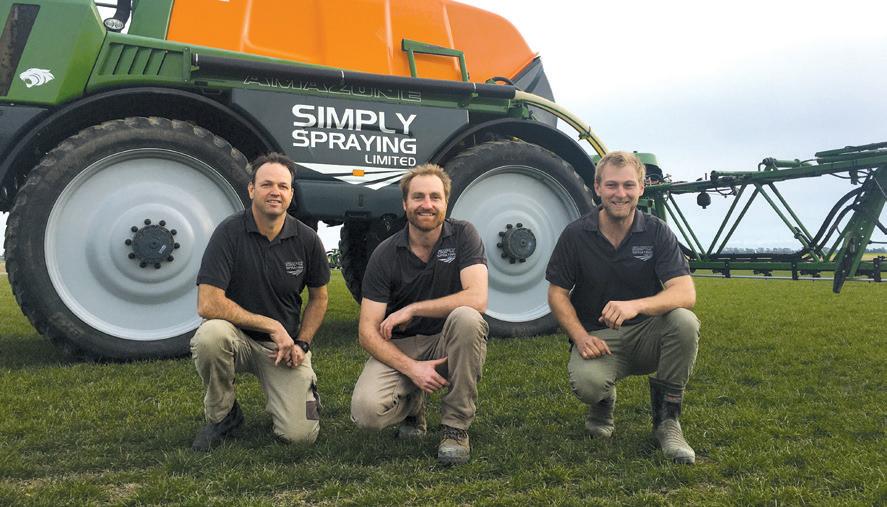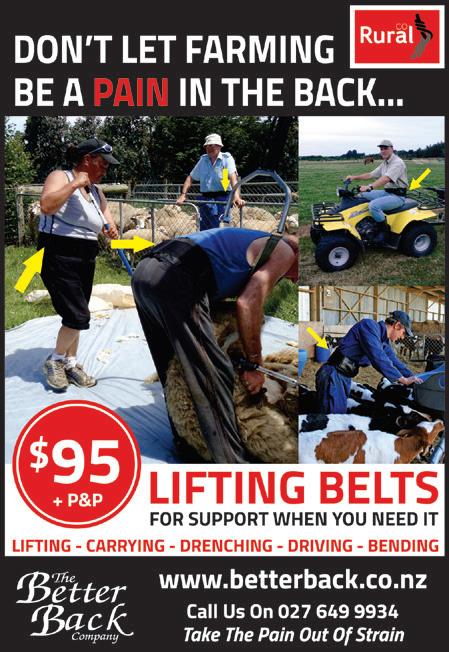
9 minute read
Be prepared for mating
by Ruralco
The dairy mating season is just around the corner. Most seasonal supply herds in the area will start mating their herds around the 20th October.
WORDS SUPPLIED BY IAN HODGE BVSC. MANZCVS. VETERINARIAN. VETENT RIVERSIDE
Advertisement
There is great importance associated with herd mating. Pregnant cows mean replacement animals and milk production. Cows pregnant in the early part of the mating period have longer lactations, and their replacements calves have greater weights at weaning. Preparation for mating needs to start early. In reality it starts the day the cow calves. From that point we need to focus on uterine health, body condition, and freedom from organic and metabolic disease. Uterine infections are common and often go undetected. Cows with these infections will not become pregnant early in the mating season, and they may be more prone to repeat cycling or abortion. If you haven’t done so already, have your veterinary practice check all cows in the herd for uterine infections. Leading up to mating, cows need to be fed so that they can increase body condition. Milk production will be increasing. This uses energy. If cows drop into negative energy balance they will not cycle early. Make sure you know the total ME value of the daily diet and the cow’s requirements to ensure you are feeding cows to gain weight and condition. Treat any lame cows. Lame cows experience pain. Painful cows will not cycle early. Check trace elements. Copper, selenium, zinc, iodine and vitamin B12 all need to be in the upper part of the normal ranges. Iodine in particular is very important for metabolic health and cycling. Consider how you will manage cycling and non-cycling cows. There are many options to get cows cycling and to synchronise cycling cows. A common and successful approach is to examine non- cycling cows before mating starts and to treat them so that they can be mated early in the mating period. First matings are not as fertile as subsequent ones. Second matings early in the mating period are often the ones that result in pregnancy. Using hormonal interventions is perfectly acceptable and highly profitable. The technology available today and the treatment regimens are far better than in the past. The Controlled Intravaginal Drug Release (CIDR) devices are very successful especially when combined with other treatments. Cycling cows can also be synchronized to cycle early as a large group. This process requires careful management to ensure these early calving groups can be fed. If you are using bulls as well as artificial insemination, now is a good time to source bulls and ensure they are fit for purpose. Bulls should be young, free of BVD and M.bovis, vaccinated against Leptospirosis (and BVD), and should have a fertility examination. At the very minimum testicular circumference is required to ensure fertility. Get bulls on farm early and allow them to socialise with each other before they are required. Herds are now mated for around 10 weeks. This is a short period, so everything has to be set up and go according to plan. The submission rate and the conception rate matter a great deal. Over a six week period an 800 cow herd with an 80% submission rate and a 50% conception rate would have 512 cows pregnant. This leaves 288 cows to be bull mated. If the submission rate was lifted to 95% and the conception rate stayed at 50% the situation would be that 220 cows would need to be mated by the bull. This illustrates the importance of getting cows cycling long before mating starts, because this will increase the submission rate, the conception rate and the pregnancy rate. You should talk to your vet about getting cows cycling and getting them pregnant.


CARD
Liquid N improves yield, soil health and bottom line
Agriculture’s most pressing challenge is raising global food production while minimising environmental degradation. For Steve and Sally Sim, farmers and owners of Simply Spraying, this means best practice for their clients and at home.
Eight years ago, Steve and Sally established Simply Spraying, a business that has built a reputation for offering timely, effective service and one that brings value to their clients’ business. As farmers themselves—they run a 265ha mixed cropping and store lamb finishing operation near Lauriston, and both with agricultural science degrees - Steve and Sally, an agronomist by trade, walk the walk of best practice. Primarily a crop spraying business, Simply Sprayings’ strategy is one of continual evolution in order to stay relevant and keep meeting its client’s needs. This has meant its list of services has grown and now includes chemical sales, Agrecovery crate sales, slug bait spreading, and the most recent, liquid fertiliser sales and application. With a focus on reliability in the peak season—the Sim’s feel lucky to have such a good team with their two experienced operators, Tommy and Hamish, working alongside them to ensure Simply Spraying can maintain quick response times. With reliability in mind, this season Simply Spraying is installing a cold-mixing plant and will be offering two products; 18% N liquid urea, as well as a 10% N and 11% S product (an order lead time exists). Simply Spraying apply this spray using Stream Bars, considered the Rolls-Royce in fertiliser application as they

have the least amount of leaf scorch possible of all nozzles, the best uniformity, and the widest application rate range. The Stream Bars eliminate overlap and are a big advantage for applying fertilisers in marginal conditions and at higher rates. Simply Spraying operates at boom widths of up to 32m with a high clearance Househam and a state of the art Amazone Pantera selfpropelled sprayer. Both machines are fitted with auto-steer and automatic section control meaning a consistently precise job every time. With impending compliance required, the Sim’s have been following recent developments in science and technology and have taken a proactive approach to nitrogen use. Moving to a liquid urea-based system, which they can now offer clients, Simply Spraying are confident that liquid N, will be part of the environmental pathway for the future of farming. “Sally and I have done considerable research and we see liquid N as a neat fit with the current direct drilling and Kinsey/Albrecht
IMAGE: Tommy Mijs, Steve Sim and Hamish Stoddart
style of fertility management on our own farm. From a biological and economic standpoint to move to using liquid N makes sense and results show a 15–20% reduction in N, yielding a similar or better pasture and cash crop production. We believe that real opportunities exist around the potential of mixing partners for use with liquid N such as sulphur, potassium and humates and look forward to some more science coming through to back these ideas up” said Steve. Being a Ruralco Supplier means Steve and Sally offer another service to make it easier for farmers in the Ashburton district, particularly those between the Ashburton and Rakaia Rivers—a key catchment area for Simply Spraying. Steve is always prepared to talk all things spraying and welcomes enquiries on how Simply Spraying can help be a part your dairy or crop farming business, to help maximise yields and benefit your environmental and economic bottom line.











Spiderban celebrates 25 years
When Mike Ward started Spiderban, 25 years ago, he wanted to provide a point of difference from other businesses in the pest elimination industry.
Hailing from Christchurch, Mike spent 10-years as a commercial window cleaner, and during this time realised that cobwebs were a big problem with clients complaining that after taking them off, only a few weeks later that they had returned. So rather than just spray and walk away, Mike and his team of technicians have developed a service that includes a free 30 minute exterior cobweb removal, prior to spraying the whole house. In 1995, Mike set up Spiderban and the business quickly grew, with urban and rural clients. The chemicals used to treat spiders and other insects have changed dramatically since then. In the early days, the treatment often marked interior and exterior surfaces, and was an irritant for some people. This was especially true when applied incorrectly and often put people off having their homes treated, however Mike’s professionalism has helped to change this view. “Now we use a synthetic pyrethroid, a thirdgeneration chemical. It is a surface treatment, so as the insect walks over the surface that has been sprayed it breaks the tiny capsule and dies. The chemical is odourless and a non-irritant” said Mike. The treatment for the interior is applied by a battery-powered motorised backpack sprayer that applies it in droplets just .25 microns in size. When applied by an experienced and qualified operator like Mike and his team, there are no runs or streaks on walls. There is no smell or mess, and the treatment is not airborne, and there is a three hour stand down period. Mike concentrates on spider and fly control, with ants and wasps also. He also does a small amount of rodent work. A lot of his customers suffer from arachnophobia, and he says he can help their situation leaving their home spider free. Mike says, staying up to date with developments in the industry is crucial, in terms of the health and safety of both himself and customers and he has a National Certificate in Urban Pest Management and is an approved Handler in Pest Control. Spiderban has grown from strength to strength, with a core part of the business servicing the rural community. “We have many loyal customers who we visit annually or bi-annually. Being a Ruralco supplier makes it easier for our farming customers as the treatment fits within pest control as a part of farm working expenses.” Alongside Spiderban, Mike started cleaning dairy sheds since 2012, and says the results are astonishing. He has before and after photos to prove the point. “In sheds where


ABOVE: Mike has a National Certificate in Urban Pest Management and is an approved handler in pest control MAIN IMAGE: Mike Ward, owner of Spiderban
grain is fed to cows while they are being milked it can be dusty and cobwebs are highly visible. We wash down the inside roof of the shed and then spider-proof it.” The service has taken off with over 650 sheds cleaned so far. The work is carried out while the cows are dried off and the shed not in use, with a chemical free washing process and then spider proofing with a dairy approved chemical. Mike and his team cover Mid Canterbury, South Canterbury, Otago and down as far as Southland. As a 25-year special, for every exterior booking made before 30th November 2020, Spiderban is offering a free inside treatment (valued up to $250). Terms and conditions apply. Give Mike and the team a call on 0800 556 778 or 027 296 1234 to make a booking.










